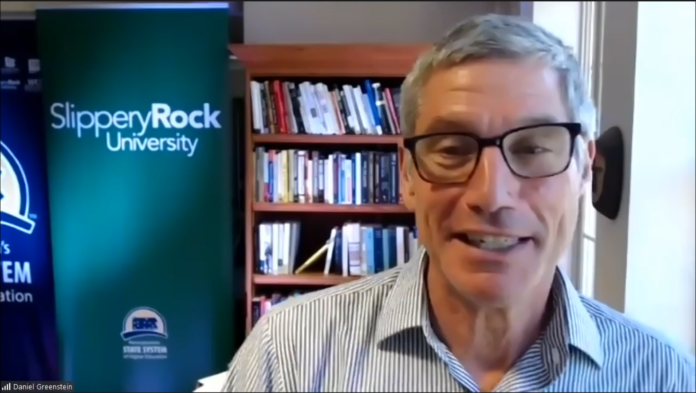In place of a campus visit, Pennsylvania’s State System of Higher Education (PASSHE) Chancellor Daniel Greenstein met via Zoom with SRU stakeholders Oct. 1 in an open forum.
Most of the time was spent with Greenstein addressing the problems the state system is facing and their plans to correct the course.
That plan, according to Greenstein, is to get insolvent universities back on their feet to where they are not a drag on the more financially stable schools, like SRU.
When Greenstein became chancellor two years ago, only Cheyney University was insolvent, today Mansfield, Edinboro and Clarion Universities are as well. PASSHE also has five other schools that are considered financially unstable.
Greenstein said he did not see the addition of three other schools to the insolvency list as anything to do with his tenure but the trajectory that the system was on when he came aboard.
If the pattern does not change, PASSHE could see Lock Haven and Shippensburg Universities become insolvent and Bloomsburg, East Stroudsburg and Millersville Universities become financially unstable.
That would leave Slippery Rock and West Chester Universities as the only financially stable schools in the state system.
How Greenstein and PASSHE plan to correct the course is a two-fold approach – stabilizing universities’ budgets and increasing faculty to student ratios to their 2010-2011 levels.
“Financial stabilization is absolutely critical,” Greenstein said. “And it’s a short-term thing, there’s a playbook. It’s not fun but it’s doable.”
Increasing faculty to student ratios will allow the universities to operate more efficiently, Greenstein said.
According to slides shown during the meeting, SRU had a ratio of 18.7 students for every faculty member compared to 20.7 students in 2010. Despite being financially sound, the state system has had to penalize universities to meet their goals by moving funding that would normally go to them to insolvent schools to keep them afloat.
SRU President William Behre added that if departments are doing well and not at the exact goal for ratios, they will work to find other ways to solve budget issues.
“I’ll be bold enough to say that if our programs are revenue positive and they’re off by a fraction of a faculty member, I’m not going to ruin a program for a fraction of faculty member,” Behre said.
Behre said SRU’s biggest issues when it comes to ratios are the increased graduate students, new majors that need tweaking and migration of students.
While graduate programs like those in healthcare have ratios far off from the goal, they are very profitable for the university, Behre said.
They may address the ratio issue by having some departments take on more first-year seminar courses, he said.
Behre added that they are not only looking at faculty ratios but staff ratios as well to cut costs where they can.
PASSHE is also counting on its restructuring that will have some universities work together in the students they serve.
Currently, PASSHE plans for Edinboro, Clarion and California of Pennsylvania Universities to create a financially stable partnership that can address the changing demographics.
Greenstein said students looking for a traditional residential college experience are declining while 50,000 Pennsylvania students choose an out-of-state online program every year. The hope is, Greenstein added, they can do for Pennsylvania students seeking undergraduate degrees what programs like Penn State University’s World Campus does for students globally, at a much lower cost.
Still, even with the cost-saving moves universities have made already, PASSHE expects to see a 12.5% decrease in enrollment along with $35 million more in loans to keep insolvent schools running.
As for funding from the state, Greenstein said it did not look promising considering that the state is running at a $3 billion deficit. According to Greenstein, PASSHE still works with lawmakers because it is a partnership, but those on the legislative side want to see the system addressing their problems.
In discussing the PASSHE response to the coronavirus pandemic, Greenstein said he was happy with the direction the system took in allowing individual universities to plan for their communities.
“From my read, things seem to be going fairly well,” Greenstein said.
Behre added that while there have been changes to the plan at SRU on a microlevel, they have been learning every day. While Behre said he is pleased that the infection rate at SRU has been low, he does not see any evidence that the current plan will change much in the future.
He added that a formal announcement about SRU’s plans going forward would be made in late October.
The chancellor was also asked what the system’s responsibilities and goals were relating to diversity and inclusion throughout SRU and PASSHE. Greenstein let Vice-Chancellor and Chief Diversity, Equity and Inclusion Officer Denise Pearson talk about what she has seen since taking the position back in August.
Pearson said she has spent the last two months talking with different groups of stakeholders across the system to understand their needs and thoughts on how universities are doing with making their environments as inclusive as possible. She plans to report her findings at the next Board of Governors meeting.
What she has seen so far is that people really want to work toward solutions, she said.
“I feel as though there is an appetite, and a willingness and a commitment across the system to really engage in the work and do more than just training,” Pearson said.
She added that university leaders will need to hold themselves accountable to improve student outcomes and the campus climate.
Greenstein added that the goals of a more diverse and inclusive system are critical components of the system’s goals.
“It’s time to step up,” he said.







